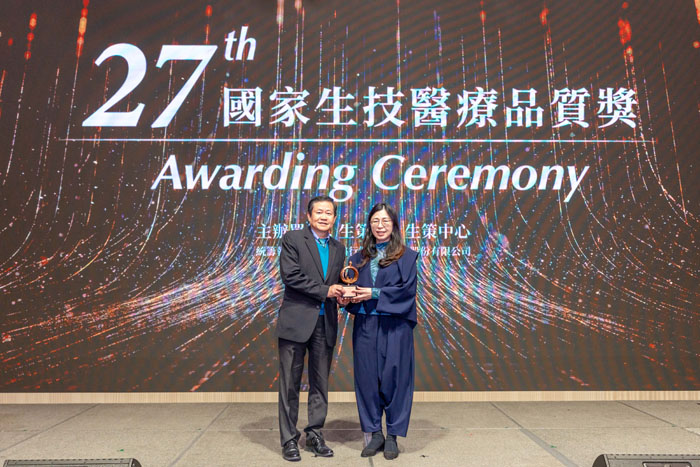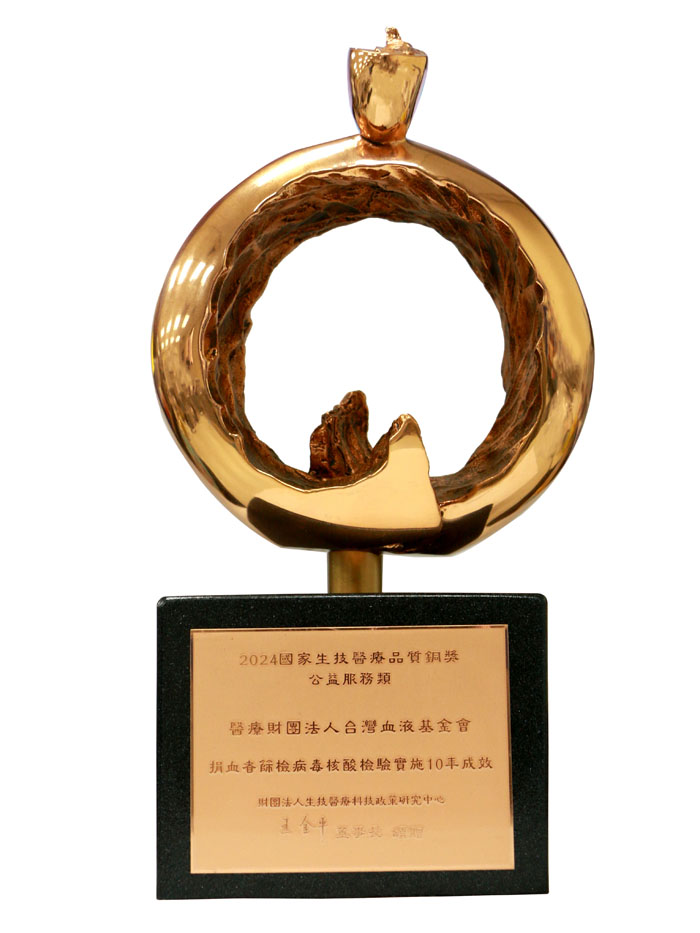Awards
2024.11.13
News | Taiwan Blood Services Foundation ESG
- News
- Awards
- Taiwan Blood Services Foundation Wins Bronze Award at the National Biotechnology and Medical Quality Awards, Receiving Recognition for the Sixth Time
Back to List
Taiwan Blood Services Foundation Wins Bronze Award at the National Biotechnology and Medical Quality Awards, Receiving Recognition for the Sixth Time
Awards
2025.01.27
Taiwan Blood Services Foundation was awarded the Bronze Award at the National Biotechnology and Medical Quality Awards for its theme, "A Decade of Achievements in Nucleic Acid Testing (NAT) for Blood Donors." The foundation also received the "SNQ National Quality Certification" for this initiative. The award ceremony was held on January 16, 2025, and the foundation’s Executive Director accepted the award on its behalf.

Taiwan Blood Services Foundation wins Bronze Award at the National Biotechnology and Medical Quality Awards for "A Decade of Achievements in Nucleic Acid Testing for Blood Donors," presented by Examination Yuan Vice President Hsu Shu-Hsiang. The award was received by Executive Director Wang Zong-Xi.

Taiwan Blood Services Foundation passes "SNQ National Quality Certification" for its achievements in Nucleic Acid Testing for blood donors.
Since January 16, 2013, the foundation has implemented NAT as part of routine blood testing. This approach has set a higher standard for medical blood quality, significantly enhancing blood safety while reducing societal costs and ensuring patient safety during transfusions.
Pathogen screening remains the most effective way to minimize transfusion-transmitted infections. NAT, being the most sensitive testing technology available, reduces the testing window period to its lowest. By employing NAT, the risk of disease transmission to recipients is greatly reduced, creating a safer blood supply chain.
Since around 1999, advanced countries in Europe and the United States began adopting NAT due to its excellent sensitivity and ability to significantly shorten the window period of Enzyme Immunoassay (EIA) tests, thereby reducing post-transfusion viral infections. By 2012, countries in the Asia-Pacific region, including Australia, New Zealand, Japan, South Korea, Singapore, Hong Kong, and Macau, had fully implemented NAT for blood donation screening.
To adopt NAT, the foundation initiated a trial program in 2007 under the supervision of the Department of Health, testing pooled samples from six donors to establish comprehensive NAT processes and layout designs. During this trial, approximately 100,000 samples were screened, and the NAT yield (EIA-negative but NAT-positive detection rate) was as high as 0.172%. Between 2008 and 2011, additional NAT pilot projects were conducted, screening around 750,000 donations in total. The studies revealed that many hepatitis B and C cases undetectable by EIA could be identified through NAT, proving the feasibility and cost-effectiveness of pooled testing for up to eight samples.
Taiwan, being a high-prevalence region for hepatitis B, has a significantly higher HBV NAT detection rate compared to Western countries. This makes the cost-effectiveness and necessity of implementing NAT even more evident. To enhance blood quality and ensure transfusion safety, NAT has been fully adopted alongside high-sensitivity serological testing, ensuring rigorous oversight of blood safety for the Taiwanese population.
Since 2013, there have been no cases of transfusion-transmitted infections for HIV, hepatitis B, or hepatitis C in Taiwan. Over the past decade, NAT has been performed on 17,922,047 donations, detecting 12 cases of HIV, 83 cases of hepatitis C, and 4,245 cases of hepatitis B that were missed by traditional serological screening. This demonstrates NAT's vital role in improving medical blood quality and patient safety. The foundation’s testing technology and standards are now on par with those of advanced countries, meeting the needs of over 900 medical institutions and 800,000 patients annually with safe blood products.
In addition to NAT, the foundation employs enhanced donor interview techniques and diversified awareness campaigns to reduce the risk of HIV-positive donors entering the blood supply. Ensuring the balance of blood donation and supply, maintaining a comfortable donation environment, and prioritizing blood quality remain the foundation’s unwavering commitments. Protecting transfusion safety and improving blood use are core values that guide the Taiwan Blood Services Foundation.

Taiwan Blood Services Foundation wins Bronze Award at the National Biotechnology and Medical Quality Awards for "A Decade of Achievements in Nucleic Acid Testing for Blood Donors," presented by Examination Yuan Vice President Hsu Shu-Hsiang. The award was received by Executive Director Wang Zong-Xi.

Taiwan Blood Services Foundation passes "SNQ National Quality Certification" for its achievements in Nucleic Acid Testing for blood donors.
Since January 16, 2013, the foundation has implemented NAT as part of routine blood testing. This approach has set a higher standard for medical blood quality, significantly enhancing blood safety while reducing societal costs and ensuring patient safety during transfusions.
Pathogen screening remains the most effective way to minimize transfusion-transmitted infections. NAT, being the most sensitive testing technology available, reduces the testing window period to its lowest. By employing NAT, the risk of disease transmission to recipients is greatly reduced, creating a safer blood supply chain.
Since around 1999, advanced countries in Europe and the United States began adopting NAT due to its excellent sensitivity and ability to significantly shorten the window period of Enzyme Immunoassay (EIA) tests, thereby reducing post-transfusion viral infections. By 2012, countries in the Asia-Pacific region, including Australia, New Zealand, Japan, South Korea, Singapore, Hong Kong, and Macau, had fully implemented NAT for blood donation screening.
To adopt NAT, the foundation initiated a trial program in 2007 under the supervision of the Department of Health, testing pooled samples from six donors to establish comprehensive NAT processes and layout designs. During this trial, approximately 100,000 samples were screened, and the NAT yield (EIA-negative but NAT-positive detection rate) was as high as 0.172%. Between 2008 and 2011, additional NAT pilot projects were conducted, screening around 750,000 donations in total. The studies revealed that many hepatitis B and C cases undetectable by EIA could be identified through NAT, proving the feasibility and cost-effectiveness of pooled testing for up to eight samples.
Taiwan, being a high-prevalence region for hepatitis B, has a significantly higher HBV NAT detection rate compared to Western countries. This makes the cost-effectiveness and necessity of implementing NAT even more evident. To enhance blood quality and ensure transfusion safety, NAT has been fully adopted alongside high-sensitivity serological testing, ensuring rigorous oversight of blood safety for the Taiwanese population.
Since 2013, there have been no cases of transfusion-transmitted infections for HIV, hepatitis B, or hepatitis C in Taiwan. Over the past decade, NAT has been performed on 17,922,047 donations, detecting 12 cases of HIV, 83 cases of hepatitis C, and 4,245 cases of hepatitis B that were missed by traditional serological screening. This demonstrates NAT's vital role in improving medical blood quality and patient safety. The foundation’s testing technology and standards are now on par with those of advanced countries, meeting the needs of over 900 medical institutions and 800,000 patients annually with safe blood products.
In addition to NAT, the foundation employs enhanced donor interview techniques and diversified awareness campaigns to reduce the risk of HIV-positive donors entering the blood supply. Ensuring the balance of blood donation and supply, maintaining a comfortable donation environment, and prioritizing blood quality remain the foundation’s unwavering commitments. Protecting transfusion safety and improving blood use are core values that guide the Taiwan Blood Services Foundation.
Share on
-
Copied to clipboard
Awards
2022.11.20
